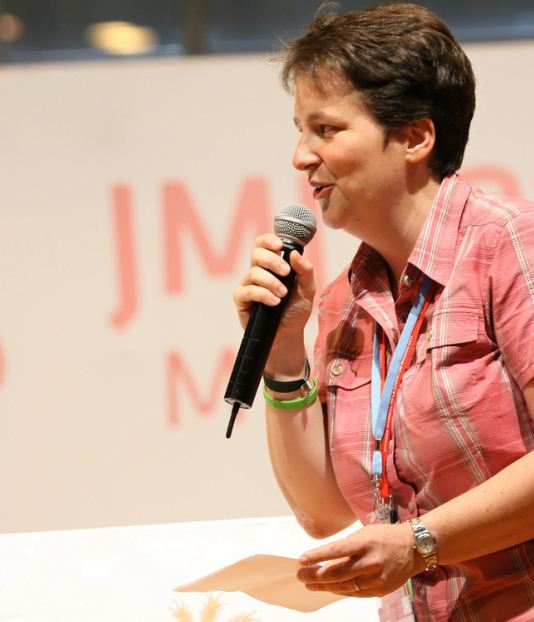Synod delegate wants young people to become active players in the Church....without mentioning God or Jesus Christ once
Claire Jonard: "I expect young people to become active players in the Church".
Claire Jonard, coordinator for the Centre romand des vocations (CRV), believes in the enormous potential that young people represent for the Catholic Church. She believes that the synod dedicated to them, which ends on 28 October 2018 in Rome, will encourage them to become even more 'active' in the Church.
She knows a thing or two about young people. Claire Jonard has been working with young people in the Church for over 20 years, first in Belgium and then in Switzerland. On 1 August 2018, the consecrated virgin was appointed president of the World Youth Day (WYD) committee for French-speaking Switzerland. cath.ch met her in Rome on 27 October, on the occasion of the conclusion of the Synod of Bishops on 'Young people, faith and vocational discernment'.
The final document of the synod is being voted on today. As someone who is 'passionate' about young people, what does this mean to you?
This unique and extraordinary event is first and foremost an opportunity to commune with the whole Church. But my main reason for coming to Rome is to make the link between the mission I've been entrusted with and what the universal Church is experiencing. I feel very strongly that something very important is happening.
In a way, you are the 'spokesperson' for young Catholics in French-speaking Switzerland. What do young people really want to say?
Above all, they no longer want to be seen as 'suspects', but as full protagonists in the life of the Church. It's important to them that this is recognised at the highest level.
Cathcon: Yet another Synod-elite self-appointed spokesperson for the People of God.
Do young people in French-speaking Switzerland have specific expectations?
Generally speaking, the service dimension is very important to them. They would like to find ways of helping those around them. And there are certainly avenues to be explored in this direction.
"Young people don't want less, they want more".
But when it comes to young people, it's important to distinguish between categories. There are many highly motivated young people who are bubbling over with ideas and activities. For them, the Synod can give an extra boost, as well as a framework for channelling their energy. Beyond them, there are many others who are "watching from afar". Who are there but not really there, who don't dare to commit themselves fully. The bishops' message must also reach this group. Their main need is to be welcomed, to be listened to, to have their questions answered. And that's where the work of the counsellors is crucial.
So how can counsellors draw inspiration from the Synod?
It can lead us to be even more attentive to the demands of young people and to give them more room to become 'actors'. But we also need to be references of trust and listening. Young people want people who are comfortable in their shoes, authentic, human and close to their concerns. The dimension of Christian evangelisation will be grafted onto this, but it may not be what they are looking for first and foremost.
How could the impetus provided by the Synod be put into practice in French-speaking Switzerland?
In French-speaking Switzerland, there are already a lot of youth structures. So perhaps the way forward is not to create new ones. But I think that initiatives will now emerge from the grassroots, from young people themselves, and that the Synod will bring about "natural" transformations.
We know that young people tend to go to Mass less. Can the Synod change things in this area?
First of all, it has to be said that Mass is not the only place for Christian life, and that there are many other ways for young people to live out their faith. Some young people don't go to Mass for many different reasons. Some don't know, or no longer know, how to behave there and feel embarrassed. For these people, it's important to say that they are welcome as they are, without judgement.
Cathcon: The Mass is the source and the summit of Christian life. If you cannot teach them that, you are lost.
For others, the "language" used in church is difficult to understand. Of course, this depends on the parish, but it would undoubtedly be possible to create more opportunities for meetings and dialogue, for example after celebrations, so that things can be explained and put into perspective using more accessible language.
Isn't there a generational problem?
It's true that in some places, young people come up against a certain amount of 'resistance' from the older generation, who are sometimes afraid of having their habits turned upside down. It's important to take these fears into account, as well as the expectations of young people. Pope Francis does not emphasise the importance of roots for nothing. Without them, we cannot grow. So we need to strike a balance between the enthusiasm and creativity of youth and the experience and wisdom of our elders.
Finally, I think that young people don't want to destroy anything, they want to create, they don't want 'less', they want 'more'.










.jpeg)

Comments